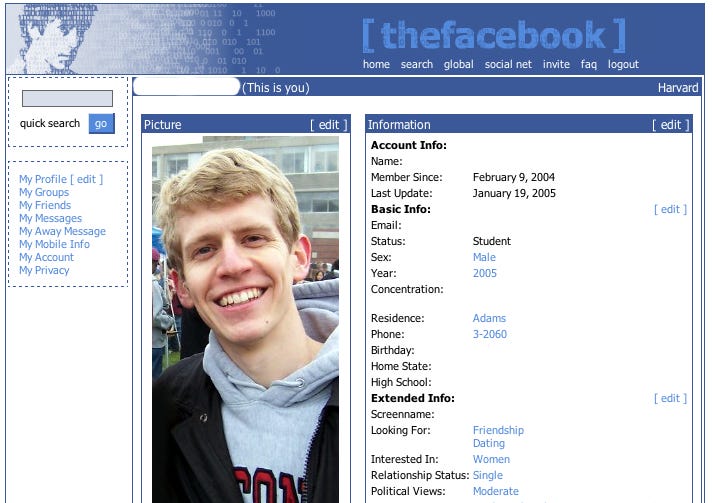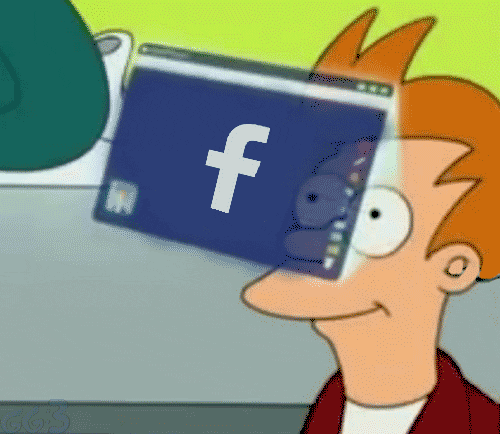how Facebook is designed to disappoint you
the root of decay lies in the business model of social media
When Facebook was first founded by Mark Zuckerberg and his college roommates in 2004, its initial vision was centered around creating a platform to connect college students and enable them to share personal information, updates, and photos within their university community. The goal was to facilitate social interactions and build an online community that mirrored real-world social circles.
This vision quickly expanded beyond colleges to encompass a global audience, with Facebook aiming to connect people across the world in a meaningful and accessible way. Today, it has more than 3 billion active users every month.
In its early years, Facebook's features and design were aligned with this vision. Users could create profiles, add friends, share status updates, post photos, and engage in discussions through the News Feed and Wall features. The platform's emphasis on real identities and genuine connections set it apart from many other online platforms at the time.
However, Facebook's journey has now led to a divergence from its original vision of connecting people in a purely positive and open manner. While its mission to connect the world remains, the realization of that vision has been complicated. The original company transitioned into Meta, and Facebook itself has long become an effective tool for privacy violations, spreading misinformation, facilitating harmful behaviors, and a giant advertising machine. Scrolling through my own feed, I counted that out of 3 posts, one would be an advertisement. One-third of my attention has already been sold to advertisers.
This story is not about Facebook. This happened to every social media app that ever went big. Twitter, now X, suffered the same fate. Instagram, Snapchat, TikTok, or even Youtube.
Every new social media platform often emerges with grand promises of connecting people, fostering meaningful interactions, or even revolutionizing communication. Yet every one of them failed.
Their failure, at its very core, lies in the design of their business model. Unlike most businesses that live and die by their customers’ money, social media has two really different interest groups: the users, and who are actually paying, the advertisers and investors.
the conflict of interest
When a social media app starts, it needs users. And users only come and stay if the platform is useful for them.
Take Facebook as an example. Initially, it provided value by connecting users with people that they cared about. This created a mutual dependency, making it hard to leave the platform. I have seen multiple people I know have to make basically a public announcement to explain they are going to log off for Facebook for a little while, as if they were being held hostage by their own platform. And they can’t leave the platform too, because then they either have to cut their friends off or convince all of them to switch altogether, both equally daunting tasks. But still, initially, your friends are still the center of your newsfeed.
But then, the platform crammed users' feeds with content from unfamiliar accounts. Initially, it prioritized posts from media companies, urging users to engage with articles and redirect traffic to various publications. As these outlets became reliant on Facebook for their audience, the platform gradually reduced their visibility. Initially, it limited traffic to publications that shared excerpts with links to their external sites, prompting them to provide full-text content within Facebook's enclosed environment.
As a result, publications became heavily reliant on Facebook, with their readers primarily accessing content through the platform rather than visiting the publications' websites directly. This dependency created a cycle where both readers and publications were held captive by each other within Facebook's ecosystem. However, Facebook adjusted its algorithms to decrease the visibility of publications' articles unless they paid to "boost" them to specific subscribers who had requested to see their content in their feeds.
Moreover, Facebook intensified its ad presence within feeds, blending sponsored content from both familiar sources and unknown advertisers. By leveraging the personal data they had collected with or without consent, Facebook offered advertisers targeted ad placements at a low cost.
Anyone who does business on Facebook also finds themselves reliant on it, unable to conduct their business effectively without its access to targeted advertising opportunities. This dependence allowed Facebook to increase ad prices and neglect concerns about ad fraud. Additionally, it colluded with Google to manipulate the ad market.
Today, Facebook has deteriorated significantly, becoming an unpleasant environment for users, media companies, and advertisers alike. The company intentionally undermined many of the publishers it relied on, deceiving them into adopting a "pivot to video" strategy based on false assertions about the popularity of video content among Facebook users. This led companies to invest billions in the pivot, only to find that the anticipated viewership did not materialize, resulting in widespread closures of media outlets.
I was thinking about leaving Facebook for a few times, but I was too lazy to make a public statement.
What users want and what advertisers want, are drastically different. Users want what the platform was originally for, what they were promised, whether it is sharing photos, texting their friends, or watching 6-second content. And when you’re done, you’re done.
But advertisers and investors don’t want that. They have to make money for their businesses. And the more you use the apps, the more ads you will see; the more personal information you surrender, the more targeted those ads become.
This ultimately means more influence they have over your decision-making and, ultimately, more profit. So advertisers and investors will never stop urging social media platforms to come up with more subtle and not-so-subtle methods to make you use the app longer and to make you provide more personal information.
The process of handling surpluses follows a pattern: initially benefiting users, then suppliers, and finally shareholders, leading to the deterioration of platforms.
This degradation of platforms is a sign of their decline, but it's a normal aspect of internet evolution.
As a new wave of social platforms emerges, such as Locket, and BeReal, there's a noticeable shift in startup approaches towards social media. Unlike Facebook, these apps don't aim to replicate entire social experiences online but rather focus on creating unique and fresh experiences tailored to specific users’ needs.
The challenge for these new entrants lies in mustering the resources to start without giving in to the temptations enjoyed by their predecessors.
There's a question of whether this time will be different. Can we develop social technology that prioritizes treating users as customers? Or, can we discover more effective ways to monetize the deep engagement seen on today's newest content platforms like Substack, OnlyFans, and Patreon? Only time can answer.
I am, personally, going to log off from Facebook for a while.








Yes, i logged out from Facebook and social media a long time ago too. I do not like Facebook, although it has fulfilled the need of social engaging, I do not like this app because it create addiction through suffering( we continue scroll till we find a good post, and we do it repeatedly) . I feel like it creates think I like to called 1% illusion (like people ignore the 80% ) completely.
You might want find the book Irresistible of Adam Alter interested, as he talk about this problem of social media and think like smart phone too.
Anyway, I so glad that someone finally talk about this ^^